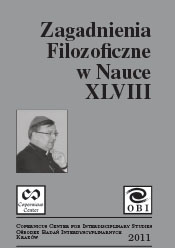Materia i przyczynowość - konkrety czy uniwersalia?
Matter and causality - concretes or universals?
Author(s): Michał HellerSubject(s): Epistemology, Logic, Early Modern Philosophy, Philosophy of Science
Published by: Copernicus Center Press
Keywords: philosophy; matter; causality; concretes; universals; David Hume;
Summary/Abstract: Humean doctrine on causality is well known. Since all our knowledge comes from experience, we are able to know that “B follows A” (B propter A) but not that “B is caused by A” (B propter A). All the rest comes from our mental habits. If we limit ourselves only to sensual experience, nothing more can be claimed on causality. However, such a strategy is very far away from what is done in physics. We cannot forget about mathematical structures physics employs for modeling the world. And there are mathematical structures that model what is transparent for sensual perceptions but what is essential for causal interaction. This is also true as far as the Newtonian physics was concerned but to see this more sophisticated philosophy of physics is needed than that Hume had at his disposal. In contemporary physics, causal interactions, as modeled by mathematics, can be drastically different from our everyday imaginations. For instance, causally related events can be space-like separated.
Journal: Zagadnienia Filozoficzne w Nauce
- Issue Year: 2011
- Issue No: 48
- Page Range: 33-45
- Page Count: 13
- Language: Polish

